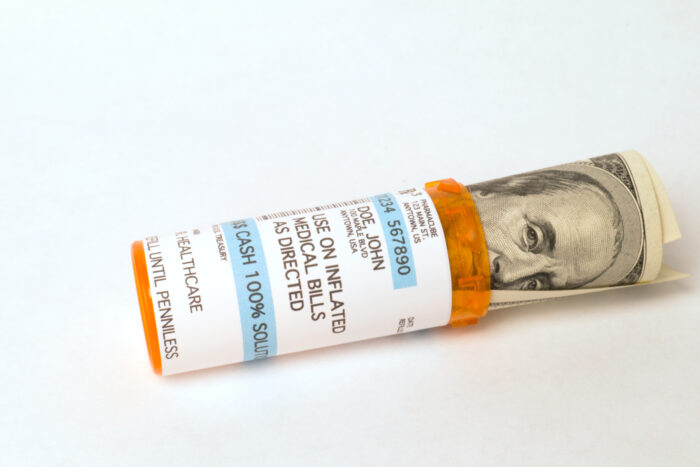7:00
News Story
Missouri governor allows ‘flawed’ bill on drug discounts to become law
A bill similar to Arkansas legislation upheld by a federal appeals court directs drugmakers to deliver medications under a federal program to any pharmacy contracted by a qualifying provider
A bill favoring Missouri pharmacies and health care providers in a national dispute with drugmakers will become law without Gov. Mike Parson’s signature.
The legislation, which passed both chambers with veto-proof majorities, bars pharmaceutical manufacturers from limiting where they will deliver drugs purchased at a discount under a federal program intended to help providers serving people in rural and high-poverty areas or with specialized health needs.
It allows medical providers qualifying for the program, known as the 340B Drug Pricing Program for the section of federal law where it is found, to enter contracts with an unlimited number of pharmacies to dispense the drugs to their patients.
The bill is “flawed,” Parson wrote in a letter explaining his action, but ultimately is better for patient access and affordability than if he vetoed it.
“Most troubling, the 340B program lacks requirements for cost savings to be passed onto patients and further lacks transparency as to how those cost savings are used,” Parson wrote.
Parson made his decision as he announced action on the last of 26 non-budget bills passed during this year’s legislative session. He had 45 days – until Sunday – to make his decisions and any bill not signed and not vetoed becomes law as if he had signed it.
Parson did not veto any bills.
The stakes nationally in the 340B program are huge, in a medical market with escalating prescription prices and increasing concentration of medical providers in direct employment by hospital groups. Nationally, pharmaceutical manufacturers sold nearly $100 billion in discounted drugs in 2021 and 2022 through the 340B program.
In 2023, a federal appeals court ruled that nothing in federal law prevents pharmacy manufacturers from limiting the number of contract pharmacies they will supply with 340B discounted products. But those limits go only so far, the 8th Circuit Court of Appeals in St. Louis ruled when it upheld an Arkansas law – very similar to the bill passed in Missouri – that bans manufacturer-imposed limits on contracts.
“The use of contract pharmacies by covered entities under the program – among other programmatic concerns – is an issue that should be addressed by Congress,” Parson wrote. The legislation, while laudable in intent, “ensures the expansion of a flawed federal program within the state of Missouri.”
Because many health care providers did not have in-house pharmacies when the 340B program was begun in 1992, a change in 1996 allowed a single contractor for each provider. That was expanded starting in 2010 to allow unlimited contracts.
The number of contract pharmacies grew from 2,321 in 2010 to 205,340 in 2024.
Pushing back against the growth, pharmaceutical companies have targeted the program’s use by “disproportionate share hospitals,” generally serving large populations of patients without insurance or on Medicaid or Medicare. Those hospitals account for about 80% of all drugs purchased through the 340B program, $41.8 billion in 2022 and $34.3 billion the year before.
Those hospitals should be required to show how they use the money to help the patients that cannot pay for doctor visits and medications, Nicole Longo, deputy vice president of public affairs at PhRMA, the lobbying arm of the pharmaceutical industry, said in an interview last month with The Independent.
“They buy low and they sell high,” Longo said. “Patients bear a lot of that cost, and so that’s a major concern of the industry.”
In a statement, Stami Williams, PhRMA spokesperson, said the association agrees that the 340B program is flawed and in need of an overhaul by Congress.
The bill that will become law, she said, “does not help vulnerable patients more affordably access medicines. This legislation is a handout to large hospital systems, chain pharmacies, and pharmacy benefit managers (PBMs).”
The Missouri Hospital Association, in a statement following Parson’s action, said the legislation will maintain access to essential medications. The overwhelming majority in favor of the bill recognized that, said Jon Doolittle, the association’s president.
“In doing so, they rejected artificial limits on pharmacies’ participation, to ensure members of their communities could access their medication and health care services close to home,” Doolittle said. “In addition, they recognized that the 340B program supports services that would not otherwise be available in many communities without the protections added through the legislation.”
The program is essential for keeping rural providers open and giving patients access to prescriptions near their homes, said Joe Pierle, executive director of the Missouri Primary Care Association.
The association represents federally qualified health centers, which serve patients regardless of their ability to pay. The health centers are the second-largest group of providers using the 340B program.
“This whole contract pharmacy (issue) is really about allowing us to contract with local pharmacies so that patients in the Mark Twain National Forest can can drive a mile or two to pick up a prescription instead of having to traverse the hills and mountains down there, which are difficult to navigate, to sometimes go to a different county to get the drugs,” Pierle said.
Criticism of contract pharmacies is a smokescreen, he said.
“Their whole focus,” Pierle said, “was trying to get everybody’s focus off the massive profits that they’re making and the high cost for medications that Missourians are having to pay.”
GET THE MORNING HEADLINES.
Our stories may be republished online or in print under Creative Commons license CC BY-NC-ND 4.0. We ask that you edit only for style or to shorten, provide proper attribution and link to our website. AP and Getty images may not be republished. Please see our republishing guidelines for use of any other photos and graphics.





